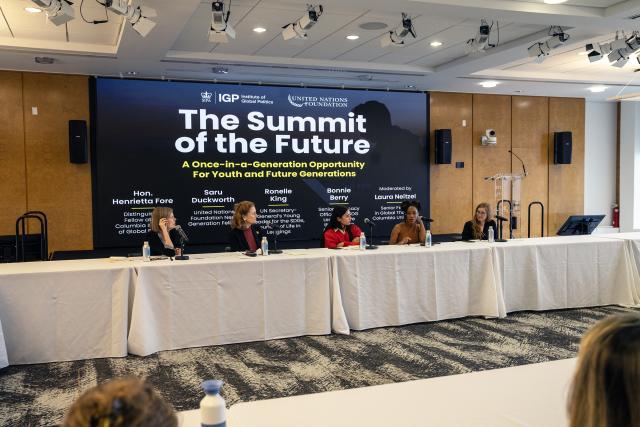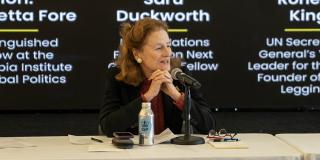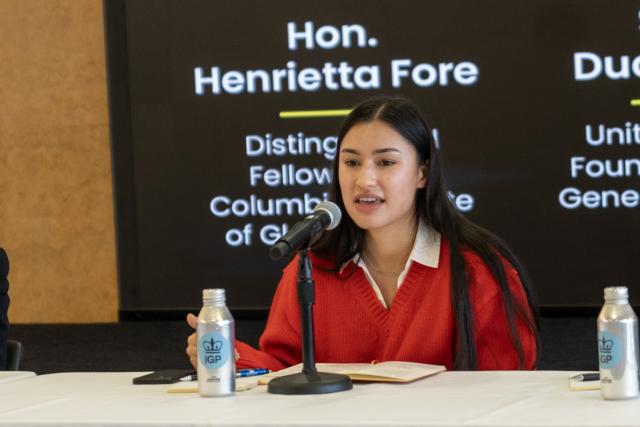
Practitioners and Young Leaders Look Ahead to UN Summit of the Future

On Tuesday, March 6, SIPA’s Institute of Global Politics hosted a roundtable to discuss policy measures and strategies for youth and future generations ahead of the the United Nations’ Summit of the Future. The Summit, which will take place in September 2024, will be “a coming together of nations and world leaders to forge a new international consensus on how to deliver a better present and safeguard the future for the generations to come.” As a result of the Summit, the UN will produce the “Pact of the Future,” which will present solutions to some of the planet’s most pressing issues which will be covered at the summit.
The panel brought together practitioners, youth experts and activists, including the Hon. Henrietta Fore, the former executive director of UNICEF and USAID administrator who is now an IGP Carnegie Distinguished Fellow; Saru Duckworth MPA-DP ’25, a United Nations Foundation Next Generation Fellow and IGP Student Scholar; Ronelle King, one of the UN Secretary General's young leaders for the Sustainable Development Goals and founder of Life in Leggings, a Caribbean alliance against gender-based violence; and Bonnie Berry, a senior advocacy officer at Save the Children International.
Too often in these processes, children are just referred to as recipients of services or a vulnerable group and so it's not reflecting their agency.
— Bonnie Berry
Fore and Duckworth have worked together in recent months as the lead authors of a report on the same topics discussed at the roundtable. Titled The Future We Choose: Building a Future of Work that Leaves No Young Person Behind, the report was published by the Next Generation Fellows and United Nations Foundation in partnership with IGP. It marks one of the most significant collaborations to date between one of IGP’s Carnegie Distinguished Fellows and an IGP Student Scholar.

The event itself was moderated by Laura Neitzel, a senior fellow in Global Thought at Columbia University, centered around the question: “What will it take for all young people to grow up with the right skills, experiences, and resources to succeed in the future?”
The discussants talked about the roles of education, technology, and finance.
“There are two trends in education that I have seen,” said Fore. “One is short, impactful videos that give you a skill by the end of the video. The second is that there's much more self-directed learning. We used to all listen directly to our professors and teachers at school. But now a lot of people are learning outside of school.”
They also spoke about the importance of providing broadband connectivity in all schools around the world, which is part of the pact, as a catalyst for greater youth inclusion and for governments to invest in their young populations.
“Once you connect every school so many things become unlocked,” Duckworth said.

It is not only broadband that will drive connectivity, but funding too. Berry raised the importance of access to funding, and why this should be included in the pact.
“We need a permanent independent multilateral sovereign debt mechanism at the UN to address some of the issues that we are currently facing. As countries are trying to negotiate debt restructuring agreements have really not progressed fast enough.”
Another challenge of the summit is inclusivity. King pointed out that there are a number of nations that are only included in these summits “just to be seen as inclusive” rather than tackling systemic issues. Many British Overseas Territories, for example, will not be given space in these discussions, and so their insights will not get heard.
Berry spoke up about the need for children to be included in these discussions.
“Too often in these processes,” she said, “children are just referred to as recipients of services or a vulnerable group and so it's not reflecting their agency.”
Fore concluded with a call to action for those in the room: “Bring the passion and bring your ideas. This group alone can change a lot of the world so just don't give up hope and take one goal at a time.”